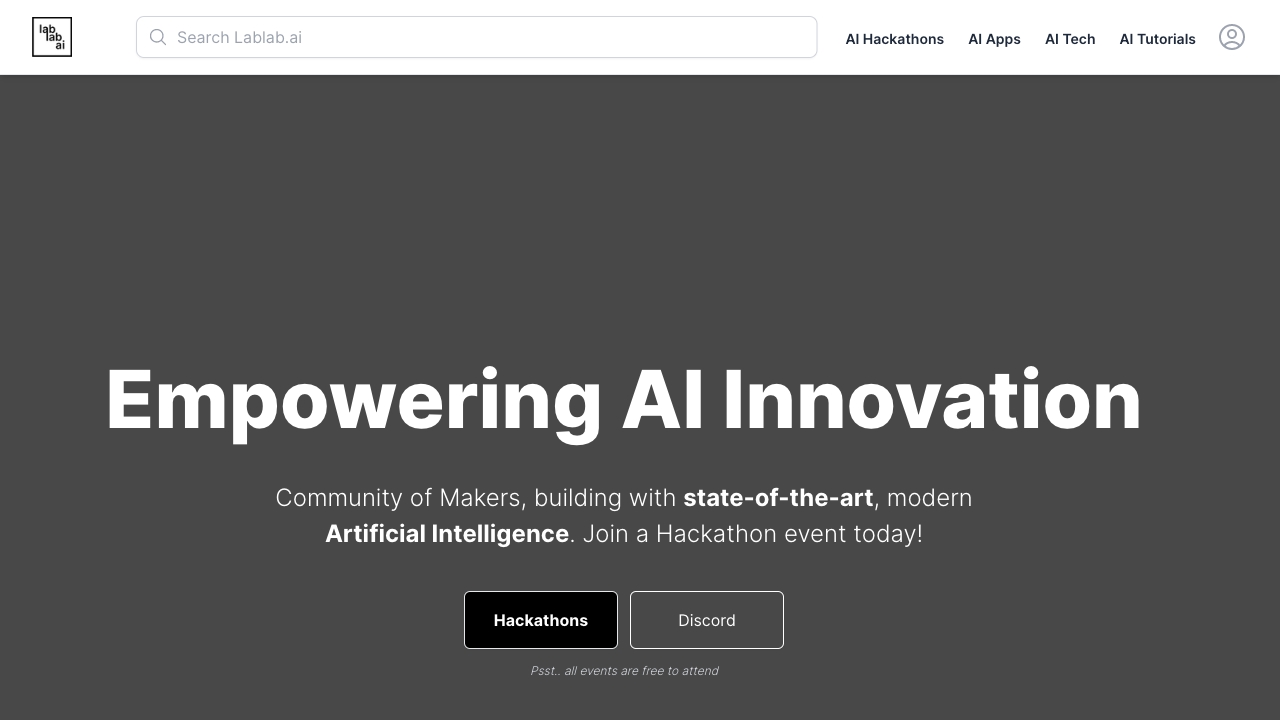- Home
- AI Developer Tools
- Lablab

Lablab
Open Website-
Tool Introduction:Builder community with AI hackathons to learn, prototype, launch.
-
Inclusion Date:Oct 21, 2025
-
Social Media & Email:
Tool Information
What is Lablab AI
Lablab AI is a community-driven platform where makers learn, build, and ship with state-of-the-art artificial intelligence. Through frequent hackathons, workshops, and mentoring, it helps teams prototype with large language models, computer vision, and generative AI—from idea to demo. By connecting founders, developers, and designers, Lablab AI accelerates experimentation and turns concepts into working proof-of-concepts. Participants gain practical skills, templates, and expert feedback while showcasing projects to a global audience. The platform fosters an AI-native mindset and supports continuous learning, collaboration, and rapid iteration.
Lablab AI Main Features
- Regular AI hackathons: Time-boxed challenges to build prototypes with cutting-edge models and tools.
- Workshops and tutorials: Hands-on sessions covering LLMs, multimodal and computer vision, agents, and prompt engineering.
- Mentorship and support: Access to mentors and an active community for feedback, troubleshooting, and guidance.
- Team formation: Find collaborators, form teams, and coordinate roles for faster prototyping.
- Starter kits and templates: Boilerplates, notebooks, and example projects to reduce setup time.
- Submission and demos: Structured project submissions, demo sessions, and judge feedback to refine ideas.
- Project showcase: Highlight your work to a global network of AI builders, founders, and potential partners.
Who Is Lablab AI For
Lablab AI suits developers, data scientists, students, product managers, designers, and startup founders who want to learn by building. It also benefits researchers validating ideas, educators running practical courses, and innovation teams exploring AI prototypes for internal use. If you aim to master LLMs, generative AI, or rapid prototyping through real challenges, this community is a good fit.
Lablab AI How to Use
- Create an account and complete your profile to signal skills and interests.
- Browse upcoming hackathons, read the rules and tracks, and select a challenge.
- Form a team or join one; align on scope, timeline, and responsibilities.
- Attend the kickoff, workshops, and office hours to plan your approach.
- Use starter kits and examples to build a prototype; iterate with mentor feedback.
- Prepare a demo, write-up, and submission materials before the deadline.
- Pitch during demo sessions, gather feedback, and continue developing post-event.
Lablab AI Industry Use Cases
Teams have used hackathon formats to prototype AI assistants for customer support, multimodal product search for retail, medical note summarization in healthcare, fraud detection workflows in finance, and adaptive learning tutors in edtech. These rapid proofs-of-concept help organizations evaluate feasibility, gather stakeholder feedback, and prioritize the most promising AI initiatives.
Lablab AI Pricing
Access to the community and many learning resources is free. Participation terms, eligibility, and any potential fees or prizes are defined per hackathon and published on the individual event page. Check each event’s details for up-to-date information.
Lablab AI Pros and Cons
Pros:
- Fast, hands-on learning through real AI challenges.
- Mentorship, peer feedback, and an active builder community.
- Starter kits and templates accelerate prototyping.
- Public demos and showcases help build your portfolio.
- Great for founders to validate ideas quickly and gather traction.
Cons:
- Time-boxed events can be intense and deadline-driven.
- Not a production hosting platform; deployment is up to teams.
- Resources and model access may vary by event and partners.
- Project quality and support depend on team composition and commitment.
Lablab AI FAQs
-
What skills do I need to join a hackathon?
Basic Python, familiarity with APIs, and an interest in LLMs or generative AI help. Designers, PMs, and no-code builders also contribute meaningfully.
-
Can I participate solo?
Yes. You can join as a solo maker or form a team to combine complementary skills.
-
Do I keep the IP of my project?
Ownership and licensing are defined in each event’s rules. Review the hackathon page before you start.
-
What tools and models can I use?
Tooling is flexible and typically includes LLMs, vision, and speech models. Specific allowances or tracks are listed per event.
-
Do I need special hardware?
Most teams build with cloud-hosted models and common developer laptops; event specifics will note any requirements.





